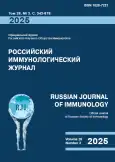Иммунологические особенности психологической адаптации в профессиональном образовании военных врачей
- Авторы: Уразмамбетов Р.Т.1, Андреева И.И.1, Антонова Е.А.1
-
Учреждения:
- ФГБОУ ВО «Ростовский государственный медицинский университет»
- Выпуск: Том 28, № 3 (2025)
- Страницы: 867-871
- Раздел: КРАТКИЕ СООБЩЕНИЯ
- URL: https://journal-vniispk.ru/1028-7221/article/view/319947
- DOI: https://doi.org/10.46235/1028-7221-17162-IFO
- ID: 319947
Цитировать
Полный текст
Аннотация
Адекватная адаптация и функционирование в определенной среде обусловлены интеграцией нервной, эндокринной и иммунной систем. Выявление тех изменений в иммунной системе, которые формируются в условиях нарушения психоэмоционального состояния и могут быть использованы в качестве предикторов развития иммунопатологии, представляет особый интерес. Наибольший прикладной выход эти исследования могут найти в условиях наблюдения за когортой молодых практически здоровых взрослых в процессе их профессионального становления. Цель работы – продемонстрировать особенности адаптационных ресурсов иммунной системы военных студентов-медиков в динамике образовательного процесса. Обследованы студенты военного учебного центра (ВУЦ) первого (18 человек), третьего (31) и шестого (34) курсов, соответствующие I группе здоровья. Психологическое тестирование осуществляли с помощью методики Ч.Д. Спилбергера, адаптированной на русский язык Ю.Л. Ханиным, позволяющей дифференцировано измерять степень выраженности ситуативной и личностной тревожности как показателя устойчивости к стрессовым факторам. Для выявления особенностей социально-психологической адаптации к академической среде использовали опросник К. Роджерса и Р. Даймонда, рассчитывая интегральный показатель адаптации (СПА). Оценку иммунного статуса осуществляли с использованием стандартных методологических подходов системно-функциональной характеристики факторов врожденного и адаптивного иммунного ответа, содержание гормонов в сыворотке крови (тестостерон, кортизол, ТТГ, общий Т3, свободный Т4) оценивали методом ИФА. Интегральный коэффициент СПА продемонстрировал постепенное улучшение приспосабливаемости к академической среде: полная адаптация вывялена лишь у 40% первокурсников; у 80% третьекурсников, у 100% – на шестом курсе. Сравнение параметров иммунного статуса с референс-интервалами практически здоровых показало соответствие у всех обследованных студентов по большинству критериев. Исключение составляют данные первокурсников, где выявлено снижение числа цитолитически активных форм натуральных киллеров: % Gr+CD16+ (min-max) = 1-10; в контроле 3-15, а также уменьшение доли моноцитов, экспрессирующих на своей поверхности TLR4: CD14+CD284+ (min-max) = 5-22%, в контроле 10-25%), были отмечены статистически значимые отличия между наблюдаемыми группами в виде преобладания уровня тестостерона и трийодтиронина у студентов первого курса, тогда как показатели кортизола, тироксина и тиреотропного гормона находились на общем уровне у студентов разных курсов. Период психологической адаптации к учебному процессу в медицинском вузе менее успешен для первокурсников ВУЦ в сравнении с другими периодами наблюдения. Именно в этой группе снижены показатели иммунной системы, ответственные за процессы первичного иммунного реагирования, что формирует возможные предпосылки развития клинических проявлений иммунной дисфункции.
Ключевые слова
Полный текст
Открыть статью на сайте журналаОб авторах
Р. Т. Уразмамбетов
ФГБОУ ВО «Ростовский государственный медицинский университет»
Email: iai3012@rambler.ru
преподаватель кафедры безопасности жизнедеятельности и медицины катастроф
Россия, Ростов-на-ДонуИ. И. Андреева
ФГБОУ ВО «Ростовский государственный медицинский университет»
Автор, ответственный за переписку.
Email: iai3012@rambler.ru
д.м.н., доцент, профессор кафедры клинической иммунологии и аллергологии
Россия, Ростов-на-ДонуЕ. А. Антонова
ФГБОУ ВО «Ростовский государственный медицинский университет»
Email: iai3012@rambler.ru
к.б.н., научный сотрудник Научно-исследовательского института клинической иммунологии
Россия, Ростов-на-ДонуСписок литературы
- Немец В.В., Виноградова Е.П. Стресс и стратегии поведения // Национальный психологический журнал, 2017. Т. 26, № 2. С. 59-72. [Nemets V.V., Vinogradova E.P. Stress and behavior strategies. Natsionalnyy psikhologicheskiy zhurnal = National Psychological Journal, 2017, Vol. 26, no. 2, pp. 59-72. (In Russ.)]
- Осницкий А.К. Определение характеристик социальной адаптации // Психология и школа, 2004. № 1. С. 43-56. [Osnitsky A.K. Definition of characteristics of social adaptation. Psikhologiya i shkola = Psychology and School, 2004, no. 1, pp. 43-56. (In Russ.)]
- Прохоров О.А. Практикум по психологии состояний: учебное пособие. СПб.: Речь, 2004. 480 с. [Prokhorov O.A. Practical training in the psychology of states: a teaching aid]. St. Petersburg: Rech, 2004. 480 p.
- Самотруева М.А., Ясенявская А.Л., Цибизова А.А. Нейроиммуноэндокринология: современные представления о молекулярных механизмах // Иммунология, 2017. Т. 38, № 1. С. 49-59. [Samotrueva M.A., Yasenyavskaya A.L., Tsibizova A.A. Neuroimmunoendocrinology: modern concepts of molecular mechanisms. Immunologiya = Immunologiya, 2017, Vol. 38, no. 1, pp. 49-59. (In Russ.)]
- Тананакина Т.П., Лысенко Е.А., Паринов Р.А. Оценка адаптационных возможностей юношей студентов медицинского вуза, обучаюшихся в разных социально-экономических условиях // Биология и интегративная медицина, 2021. № 6 (53). С. 341-349. [Tananakina T.P., Lysenko E.A., Parinov R.A. Assessment of the adaptive capabilities of young male students of a medical university studying in different socio-economic conditions. Biologiya i integrativnaya meditsina = Biology and Integrative Medicine, 2021, no. 6 (53), pp. 341-349. (In Russ.)]
- Хайдуков С.В., Байдун Л.А., Зурочка А.В., Тотолян А.А. Стандартизованная технология «Исследование субпопуляционного состава лимфоцитов периферической крови с применением проточных цитофлюориметров-анализаторов» // Медицинская иммунология, 2012. Т. 14, № 3. С. 255-268. [Khaidukov S.V., Baidun L.A., Zurochka A.V., Totolyan A.A. Standardized technology “Study of the subpopulation composition of peripheral blood lymphocytes using flow cytofluorimeter analyzers”. Meditsinskaya immunologiya = Medical Immunology (Russia), 2012, Vol. 14, no. 3, pp. 255-268. (In Russ.)] doi: 10.15789/1563-0625-2012-3-255-268.
- Хаитов Р.М., Пинегин Б.В. Оценка иммунного статуса человека в норме и патологии // Иммунология, 2001. № 4. С. 4-6. [Khaitov R.M., Pinegin B.V. Assessment of human immune status in health and disease. Immunologiya = Immunologiya, 2001, no. 4, pp. 4-6. (In Russ.)]
- Bower J.E., Kuhlman K.R. Psychoneuroimmunology: An introduction to immune-to-brain communication and its implications for clinical psychology. Annu. Rev. Clin. Psychol., 2023, Vol. 19, pp. 331-359.
- de Punder K., Heim C., Wadhwa P.D., Entringe S. Stress and immunosenescence: The role of telomerase. Psychoneuroendocrinology, 2019, Vol. 101, pp. 87-100.
- Weber A., Weber B., Delport S. Preparing undergraduate student paramedics to consider their mental health during clinical placement in Australia. Australas. Emerg. Care, 2023, Vol. 26, no. 4, pp. 341-345.
Дополнительные файлы







